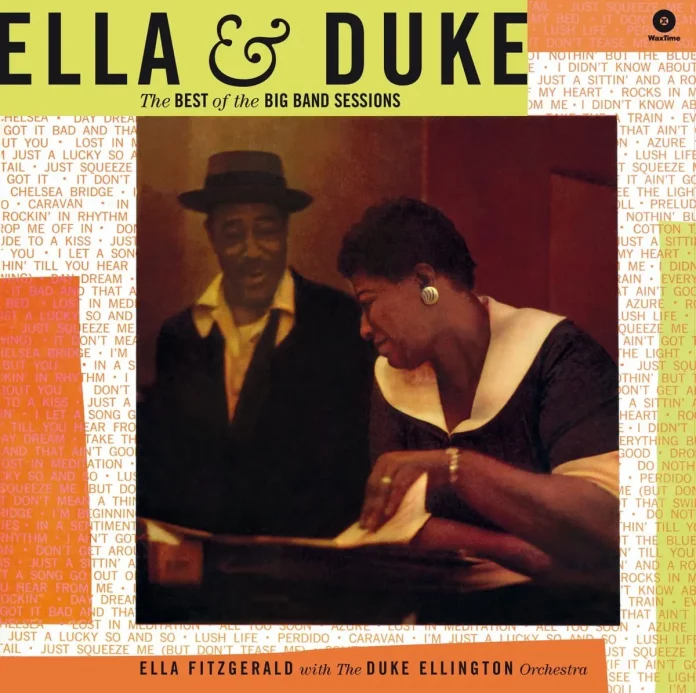This is a double review, of two titles – Ella Sings The Duke Ellington Songbook – The Best Of The Small Group Sessions and Ella & Duke – The Best Of The Big Band Sessions. The sessions were linked in 1957, the original album being issued as two volumes. There was also a third disc originally issued, featuring two original compositions by Billy Strayhorn, based upon Fitzgerald’s life and career. One of the tracks from that album (Chelsea Bridge) is included on the big band set here.
Fitzgerald was a pioneer in terms of the “songbook” concept, recording numerous albums for Verve each featuring the works of a single composer. This time she turned her attention to Duke Ellington. Despite their paths having crossed in earlier decades, there is no trace of them having recorded together until these sessions. However, Ellington’s lack of time meant that all of the arrangements and new compositions were left to Billy Strayhorn.
The Ella-Duke studio sessions did not go well, despite the quality of the music recorded. In 1979, Granz admitted that “it was done under the worst conditions”. The recording was being undertaken by Verve, but Ellington was under contract to Columbia. In exchange for Granz allowing Johnny Hodges to rejoin Ellington’s band, a few concessions were forced – “I would have Duke for one LP, two if I used Ella”.
Ellington failed to provide a single arrangement, with Fitzgerald having to make do with what the band had already rehearsed for Ellington. Several devices were used to remedy the problem, with Fitzgerald opting to sing a vocal where an instrumental chorus would normally go, and saxophonist Ben Webster being brought in to give it a more “Ella” sound. The small-group session was another idea used to bring some order to the project, with musicians familiar to Fitzgerald (Oscar Peterson, Paul Smith, Barney Kessel and Herb Ellis) being deployed.
The fact that the album was a critical and commercial success is probably down to the strength of Ellington’s songs, Fitzgerald’s capacity to excel in the songbook format and the tenacity and determination of Norman Granz to pull off a rare session. It was also the only songbook session where the composer also featured as a performer – albeit spasmodically. But it is the strength of Ellington’s songs that should be appreciated on this album rather his performance, as the real star of the show was undoubtably Fitzgerald.
The two albums are missing several tracks from the original releases, including I Ain’t Got Nothing But The Blues, Clementine, Lost In Meditation and Rocks In My Bed. Fans will have different views as to what the final cut should have looked like, but what remains is highly listenable.
The heavyweight vinyl is up to the challenge and produces an excellent clean sound. These two albums make a great introduction to two of the greatest jazz talents and the magic that can be created despite formidable obstacles.
Discography
LP1: [The Best Of The Small Group Sessions] (1) Cotton Tail; Solitude; Satin Doll; Don’t Get Around Much Anymore; It Don’t Mean A Thing (If It Ain’t Got That Swing); In A Sentimental Mood; Prelude To A Kiss; Azure; Do Nothin’ Till You Hear From Me; Just A-Sittin’ And A-Rockin; (2) Mood Indigo; (2) In A Mellow Tone; (1) Sophisticated Lady; (2) Lush Life (55.56)
LP2: [The Best Of The Big Band Sessions] Rockin’ In Rhythm; Drop Me Off In Harlem; Day Dream; Caravan; I Didn’t Know About You; Take The “A” Train; I’m Beginning To See The Light; Perdido; I’m Just A Lucky So And So; All Too Soon; I Got It Bad (And That Ain’t Good); Chelsea Bridge (54.39)
Fitzgerald (v) on all tracks with:
LP1: (1) Ben Webster (ts); Stuff Smith (vn); Paul Smith (p); Barney Kessel (g); Joe Mondragon (b); Alvin Stoller (d). Hollywood, September 1956. (2) Ben Webster (ts); Oscar Peterson (p); Herb Ellis (g); Ray Brown (b). Hollywood, October 1957.
LP2: Ellington (p); Billy Strayhorn (p); Cat Anderson, Willie Cook, Ray Nance, Shorty Baker, Dizzy Gillespie (t); Quentin Jackson, Britt Woodman (tb); John Sanders (v, tb); Jimmy Hamilton (cl); Russell Procope (as, cl); Johnny Hodges (as); Frank Foster, Paul Gonsalves (ts); Harry Carney (bar, bcl, cl); Jimmy Woode (b); Sam Woodyard (d). New York, 24-27 June 1957.
Waxtime 772303 & 772304
















